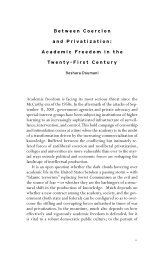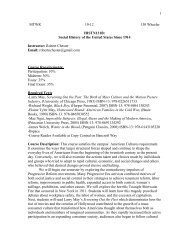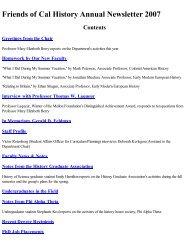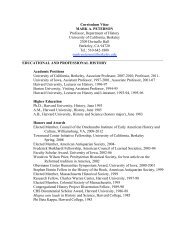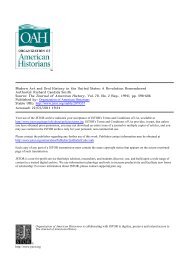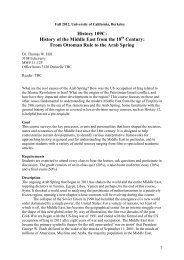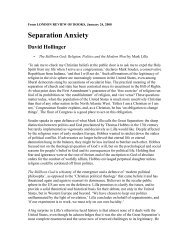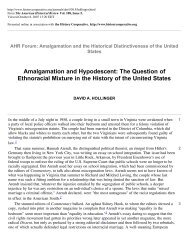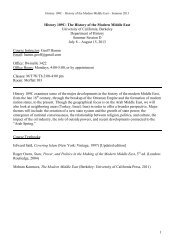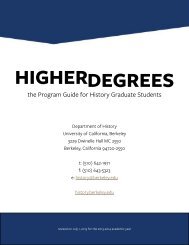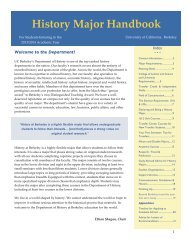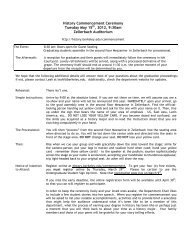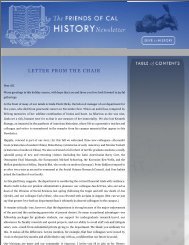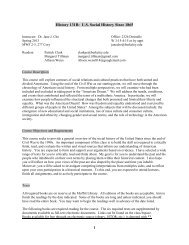My Grandmother and Other Stories: Histories of the Palestinians as ...
My Grandmother and Other Stories: Histories of the Palestinians as ...
My Grandmother and Other Stories: Histories of the Palestinians as ...
Create successful ePaper yourself
Turn your PDF publications into a flip-book with our unique Google optimized e-Paper software.
today ‘pulp fiction’. He also read ‘marriage manuals’, such <strong>as</strong> “Selecting Your Wife”<br />
(“Intikhab al-Zawja”), “Night <strong>of</strong> <strong>the</strong> Wedding” (“Lailat al-Urs”), <strong>and</strong> “Our Sexual<br />
Life” (“Hayatuna al-Tan<strong>as</strong>uliyyah”). These were most likely local translations <strong>of</strong><br />
English <strong>and</strong> French pamphlets read surreptitiously at work, for fear <strong>of</strong> being caught by<br />
his fa<strong>the</strong>r. Ihsan narrates how his Turkish, Albanian <strong>and</strong> Arab military <strong>of</strong>ficers (such<br />
<strong>as</strong> Faris Effendi, <strong>and</strong> Ismail al-Mani) would rebuke him whenever <strong>the</strong>y caught him<br />
reading, mostly out <strong>of</strong> anti-intellectual motivations than concern for his work. At le<strong>as</strong>t,<br />
this is what Turjman claimed. He also read <strong>the</strong> local press with great enthusi<strong>as</strong>m. His<br />
favourite w<strong>as</strong> a weekly <strong>of</strong> political satire called al-Himara (‘The Donkey’), which<br />
made fun <strong>of</strong> <strong>the</strong> leadership <strong>of</strong> <strong>the</strong> CUP, <strong>the</strong>reby implying that Ottoman censorship w<strong>as</strong><br />
much more lax than believed during <strong>the</strong> war years.<br />
The Rupture <strong>of</strong> Ottoman Identity<br />
Ihsan’s diary is exceptional for its extreme positions against Jamal P<strong>as</strong>ha <strong>and</strong> <strong>the</strong> CUP<br />
leadership. What we should compare it to is not Arab nationalist historiography <strong>of</strong><br />
<strong>the</strong> post-war period, but with <strong>the</strong> works <strong>of</strong> contemporary writers, such <strong>as</strong> Muhammad<br />
Izzat Darwaza’s memoirs, <strong>and</strong> As’ad Rustum’s autobiography. Both authors began<br />
<strong>the</strong>ir political careers <strong>as</strong> Ottoman decentralists <strong>and</strong> ended up joining <strong>the</strong> Arab<br />
nationalist camp. In Ihsan’s circle, both Sakakini (his teacher) <strong>and</strong> Omar Salih al-<br />
Barghouti (his friend) wrote memoirs indicating an ambivalent attitude towards<br />
Ottoman decentralism during <strong>the</strong> war. As <strong>the</strong> war progressed, both <strong>of</strong> <strong>the</strong>m began<br />
to identify with <strong>the</strong> leadership <strong>of</strong> Prince Faisal. Rustum eventually joined <strong>the</strong> Arab<br />
rebellion in Jabal Druze <strong>and</strong> became Faisal’s private secretary. Sakakini escaped from<br />
Dam<strong>as</strong>cus after he w<strong>as</strong> rele<strong>as</strong>ed from jail (in 1918) <strong>and</strong> went over to <strong>the</strong> rebel side–<br />
where he w<strong>as</strong> credited with writing <strong>the</strong> Arab National An<strong>the</strong>m. For all <strong>of</strong> <strong>the</strong>m, <strong>the</strong><br />
turning point w<strong>as</strong> <strong>the</strong> Aley military trials after which Syrian nationalists were hanged<br />
in Beirut in August 1916.<br />
By contr<strong>as</strong>t, several members <strong>of</strong> <strong>the</strong> Jerusalem intelligentsia continued to favour a<br />
settlement that would maintain Palestine <strong>as</strong> an Ottoman province until <strong>the</strong> end <strong>of</strong> <strong>the</strong><br />
war. Those included Adel Jaber, who edited al-Hayat in Jerusalem <strong>and</strong> Jaffa, Sheikh<br />
Muhammad al-Salih, director <strong>of</strong> Rawdat al-Maarif, <strong>and</strong> Mahmud al-Jawish, principal<br />
<strong>of</strong> al-Salahiyyah college. Omar al-Salih, in his autobiography, discusses meetings held<br />
by Jamal P<strong>as</strong>ha with Arab leaders in Jerusalem <strong>and</strong> Dam<strong>as</strong>cus in 1916 <strong>and</strong> 1917 to<br />
discuss a Turkish-Arab confederation. 62<br />
Turjman’s diary is a sustained tirade against Jamal <strong>and</strong> Anwar P<strong>as</strong>ha. The thrust <strong>of</strong><br />
his attack is related to Jamal’s failed campaign in <strong>the</strong> Suez <strong>and</strong> <strong>the</strong> Sinai desert fronts,<br />
which involved many friends <strong>and</strong> relatives <strong>of</strong> Ihsan. Turjman’s recurrent nightmare is<br />
to be sent to <strong>the</strong> front. His portrayal <strong>of</strong> Jamal is contradictory. On <strong>the</strong> one h<strong>and</strong>, he is<br />
[ 46 ] HISTORICAL FEATURES The Short Life <strong>of</strong> Private Ihsan



